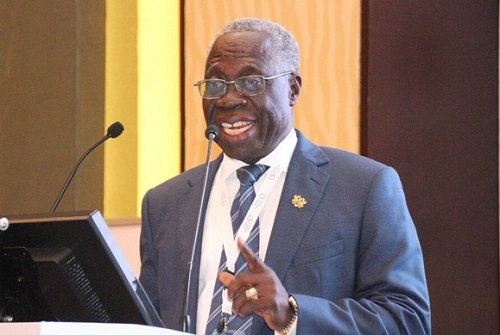
Implementing Ghana Education Outcomes Project: Ministry signs contract with 3 service providers
The Ministry of Education has signed a contract with three service providers to undertake an outcomes-based project under the Ghana Education Outcomes Project (GEOP) within the educational space.
They are Plan International, StreetChild and School for Life Rising Education Outcomes Fund (SFLREOF) with KPMG as an independent verification Agency (IVA). Its role is to verify if the agreed outcomes have been achieved.
The service providers were selected after a rigorous procurement process guided by the World Bank procurement standards, President Nana Addo Dankwa Akufo-Addo announced in a speech read for him by his Senior Presidential Advisor, Yaw Osafo-Maafo at the launch in Accra.
The beneficiary districts have been grouped into two broad categories with Lots one to six being the rural components while Lot seven is the urban component.
Under the rural components, the three service providers, who have already signed the agreement with the government, have been assigned two lots each.
The StreetChild has been given lots one and two while lots three and six had been given to SFREOF and the remaining four and five given to Plan International.
The Lots one to six components, which is the rural aspect, focuses strictly on training the out-of-school children between the ages of eight and 16 years through a nine-month complementary basic education (CBE) programme, after which they would be re-integrated into the mainstream schools.
Urban component
Lot seven, which is the urban component and described as ‘unique’, the service provider, StreetChild, has accepted the offer but has yet to sign the agreement.
The Lot, however, has a different design because its focus is on out-of-school children between the ages of eight and 18 on the streets of the Greater Accra area and the Kumasi Metropolitan area.
The project is being funded with a grant of $25.5 million from the Foreign Commonwealth Development Organisation (FCDO) through the Global Partnerships for Result-Based Approaches Trust Fund (G0RBA-TF) and a counterpart funding of $4.5 million from the Government of Ghana.
Implementation
Throwing more light on the working of the beneficiaries, President Akufo-Addo explained that under the Lot seven component, leaners will have the option to participate in a three to six months CBE programme, after which they will be trained either by master craftsmen through the informal skills training programme with an award in a certificate of competence or through the formal track, where they would be awarded the National Proficiency 1 & 2 certificates.
The President, however, added that on the other hand, learners would have the opportunity to participate in the nine-month CBE programme after which they would be transitioned into mainstream schools.
“In the light of all these, the ministry will be implementing this project with service providers, KPMG and key implementing agencies under the ministry,” he explained.
President Akufo-Addo listed the implementing agencies as the Ghana Technical and Vocational Educational Training Service (TVETS), the Commission for TVET (CTVET), Ghana Education Service (GES), the GALOP Secretariat, the National Council for Curriculum Assessment (NaCCA) and the management unit of GEOP.
“These agencies will each perform critical roles in the implementation process. An example is the Ghana TVETS and the CTVET, which will handle the informal and formal interventions under the urban component,” President Akufo-Addo explained.
Outcome-based
The Minister of Education, Dr Yaw Osei Adutwum, said he was happy that the project was outcome-based and reminded the service providers they would only be paid based on the successful outcomes.
The Education Practice Manager of the World Bank in charge of the West and Central Region of Africa, Dr Scherezad Latif, said the bank was looking forward to the continued cooperation, coordination and speedy implementation by the Ministry of Education and the government in achieving the objectives of the project.
The British High Commissioner to Ghana, Harriet Thompson, expressed delight that the focus was on reaching those children who were hardest to reach.
